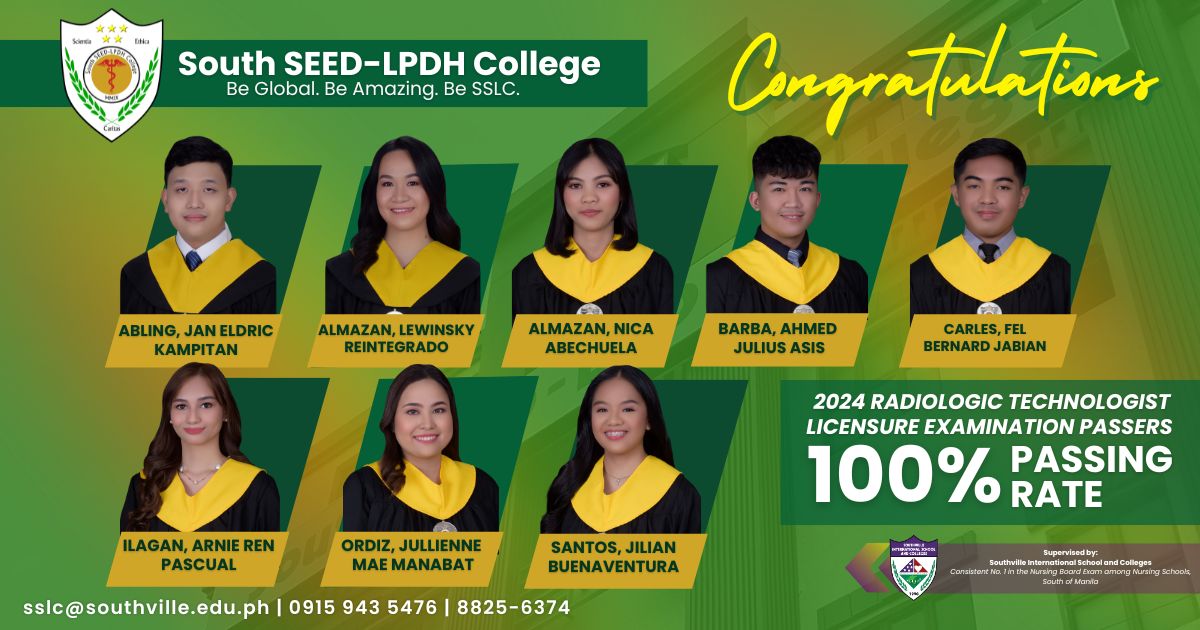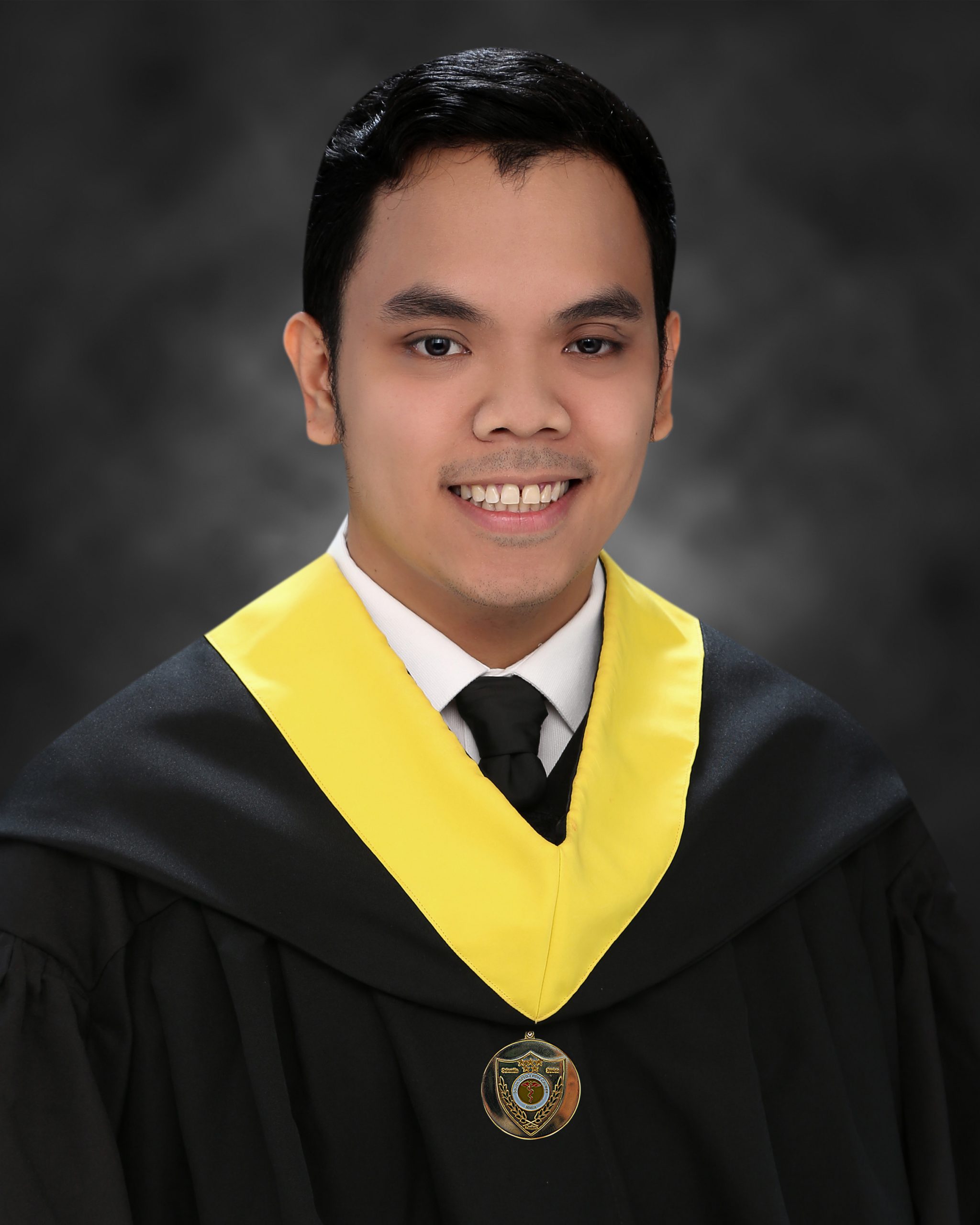
SSLC Celebrates 100% Board Passing Rate for BS Radiologic Technology
South SEED-LPDH College, a leading health-allied institution in the South of Manila, has achieved a 100% passing rate in the recent Radiologic Technology Licensure Examination (RTLE). This exceptional outcome underscores the college’s dedication to academic excellence and its commitment to producing highly skilled healthcare professionals.
South SEED-LPDH College, managed by Southville International School and Colleges, offers distinguished BS Medical Technology, Pharmacy, and Radiologic Technology programs. Located in Las Piñas City, the college results from a collaborative partnership with Las Piñas Doctors Hospital, ensuring students receive a comprehensive education combining theoretical knowledge and practical experience.
The Professional Regulation Commission (PRC) recently announced the RTLE results, revealing a national passing rate of 57.56%. Among the successful examinees were all graduates of South SEED-LPDH College, a testament to the dedication and hard work of both students and faculty.
South SEED-LPDH College celebrates this significant achievement and remains committed to providing exceptional education and training to aspiring healthcare professionals.
For more information about South SEED-LPDH College and its programs, visit their website or contact their admissions office.

Take the next step
OR
Why study Radiologic Technology at SSLC?
The four-year degree program ar in-demand in hospitals and clinics worldwide. Licensed Radiologic Technologists (RTs) are offered high salaries. SSLC teaches students of BSRT techniques and procedures to ward off that notion (RTs) of being contaminated by radiation. Students are taught to operate medical imaging equipment and web-based software programs. The program is a member of the Philippine Association of Radiologic Technologists Inc. (PART) and the Philippine Society of Government Radiologic Technologists (PSGRT). Student Internship is provided mainly by Las Piñas Doctors Hospitals (LPDH). Other hospitals of choice are National Orthopedic Hospital, East Avenue Medical Center, and Philippine Heart Center.
Bachelor of Science in Radiologic Technology (BSRT) is a four-year degree program consisting of general education and professional courses. The fourth year is undertaken as a Clinical Education Training Program in accredited affiliation centers. The program affords training in general radiography and the special fields of Radiology including Ultrasound, computed Tomography, Magnetic Resonance Imaging, Mammography, Nuclear Medicine, Radiotherapy, Interventional Radiology, and other emergent fields.
1st Year
- Understanding the Self
- Purposive Communication
- Living in the Information Technology Era
- Logic
- Introduction to Radiologic Technology and Healthcare
- Human Anatomy & Physiology with Pathophysiology
- Physical Fitness and wellness
- National Service Training Program 1
- IC – Hallmarks
- Mathematics in the Modern World
- Science, Technology & Society
- College Physics 1
- Environmental Science
- Medical Terminology
- Administration and Leadership
- Patient Care and Management
- Physical Education 2: Ballroom Dancing
- National Service Training Program 2
- Institutional Course (IC) 2: Values and Character Development
2nd Year
- Life and Works of Rizal
- World Literature
- Principles of Imaging
- Imaging Science and Informatics
- Radiation Production and Characteristics
- Pharmacology and Venipuncture
- Individual or Dual Sports
- Intrapersonal/Interpersonal Relation or EQ
- Professional Ethics, Jurisprudence and Cultural
- Radiographic Anatomy and Physiology
- Ethics
- The Contemporary World
- Reading in Philippine History
- Art Appreciation
- Radiobiology
- The Entrepreneurial Mind
- Film-Screen Image Acquisition, Processing and Image Analysis Computed and Digital Radiography
- Imaging Equipment and Maintenance
- Team Sports
- Achievers Core Training
3rd Year
- Radiographic Positioning and Radiologic Procedures 1
- Radiologic Procedures 1
- Radiologic Contrast Examinations
- Ultrasonography
- Radiation Protection
- Radiologic Pathology
- Quality Assurance and Quality Control
- Introduction to Research
- Leadership and Leadership Process
- Radiographic Positioning and Radiologic Procedures 2
- Computed Tomography
- Magnetic Resonance Imaging
- Mammography
- Interventional Radiology
- Radiotheraphy
- Nuclear Medicine
- Research Writing
- IC 6: Professionalism and Urbanity
- IC 7: 5Cs in the workplace
4th Year
- Clinical Education 1
- RT Integrated Learning Program 1
- Seminar 1
- Clinical Education 2
- RT Integrated Learning Program 2
- Seminar 2
Employment opportunities for BS Radiologic Technology graduates include various industries such as research, government, academe, corporate and tertiary hospitals such as the Asian Hospital and Medical Center, Cardinal Santos Hospital, St. John Paul Hospital in Las Pinas as well as placement in regions with exploding demand of healthcare professionals like the Middle East and the United States.
SSLC College of Radiologic Technology envisions itself to become a leading institution in providing the industry with locally oriented but globally competitive radiologic technology professionals whose knowledge, skills and attitude are on a par with International standards and new global thrusts.
South SEED-LPDH College (SSLC) College of Radiologic Technology is committed to prepare students for successful careers, to promote ethical practice in Pharmacy, and become productive and responsible citizens through LIFE.
LEAD. Empower student leaders to prepare them for leadership roles.
INNOVATIVE. Promote innovation and excellence in education to train students to become the best professional Radiologic Technologist and take care of the improvement in the field of Radiologic Technology by implementing new discoveries, developing and implementing advances that will spell the edge of SSLC graduates over those who graduated from other universities.
FUSE. Link/partner with industry- related agencies, community officers and other related organizations here and abroad to expand curricular and co- curricular programs and resources.
EDUCATE. Prepare students to become the best professional radiologic technologist through developing their love for scholarship in pursuit for updated knowledge and skills integrating practice.
- Competent Faculty with post graduate degrees in their field of specialization and extensive industry practice
- All the faculty are members of Philippine Association of Radiologic Technologist, Inc. (PART) and Philippine Society of Government Radiologic Technologists (PSGRT)
Student Testimonial

I am very grateful to SSLC. The school has been the foundation of my career as a radiologic technologist. It has taught me the value of leadership, the value of education, and also the value of family. Without this school I wouldn’t have been able to fulfill my dream as a Radiologic Technologist.
I am certain that you will find the class sessions challenging and stimulating. I hope that although your MBA programme involves a lot of serious academic work, it will be a meaningful and enjoyable experience for you.
Although online classes are much difficult than face-to-face classes, In my experience, I realized that when you only focus and try not to get distracted during online classes, you actually can still learn and comprehend the topics just like how you learn in a face-to-face class especially when the instructor teaches well and does everything to make you understand the topic. It’s really up to the students on how much they want to learn.



